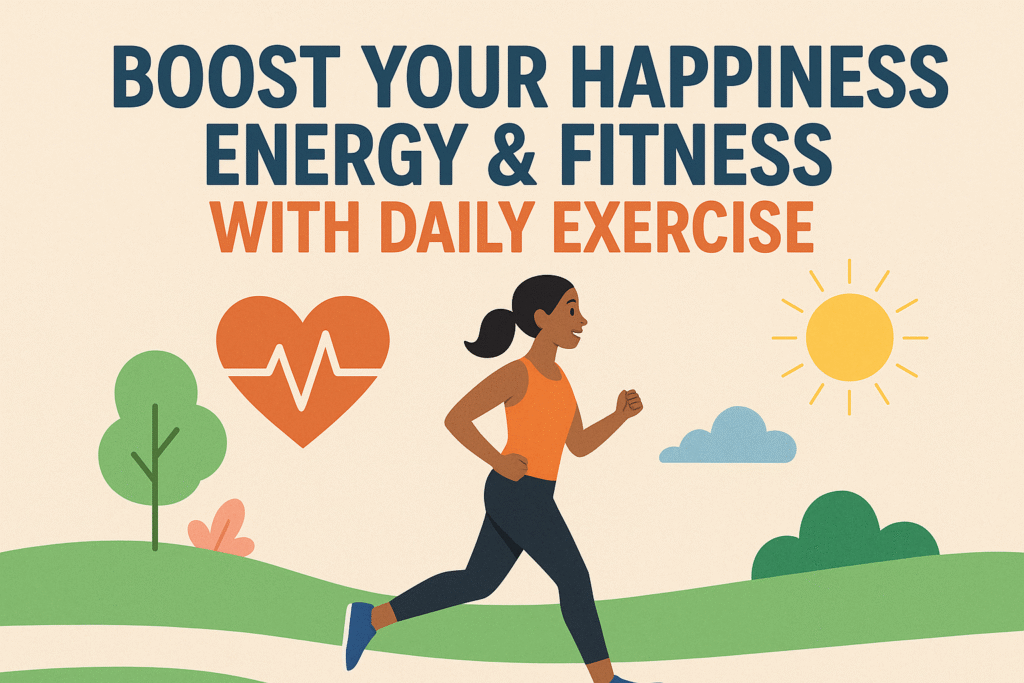
Boost Your Happiness, Energy & Fitness with Daily Exercise
Life gets busy, and when it does, health usually is below the priority levels. So here’s the thing: what if there was only one habit that could make you more energetic, reduce stress, and keep your body strong? That’s exactly what regular exercise can do. Let’s get down to the math: nourishing your body every day — physically, mentally and even spiritual scientifically — and how to do it in your daily routine.
The Triple Win of Moving Your Body
That “high” you sometimes feel after a good workout is not just in your head. To walk, jog, or work out everyday exercise gives you three major wins: more energy, less stress, and better long-term health.
1. Energy Boost
- When your heart and lungs get stronger, they pump effectively, moving oxygen and nutrients through the body. Beginning everyday activities to feel easier.
- Exercise helps your cells’ mitochondria (your body’s tiny power plants) work better, which means more natural energy.
- Regular movement improves your sleep. And when you sleep better you wake up with more energy to go on with the day.
2. Stress Relief & Mental Well-Being
- Exercise triggers the release of endorphins — natural “feel-good” hormones in your body that help improve mood and reduce stress.
- It also helps balance cortisol, the stress hormone, so you feel calmer and more in control.
- Focusing on movement gives your mind a break from worries and clears mental clutter.
- Over time, exercise makes you more emotionally resilient — better able to bounce back when life gets tough.
3. Strong Body, Long-Term Health
- A mix of aerobic, strength, flexibility, and balance exercises helps protect muscles, bones, and joints as you age.
- Cardio activities like brisk walking, swimming, etc., keep your heart healthy and decrease your risk of disease.
- Sticking with a routine supports weight control, improves metabolism, and helps you live longer.
Making Exercise Part of Your Day
- Use short bursts. Take the stairs, walk in breaks or stretch instead of sitting still.
- Stay flexible. Make time for exercise but don’t give up and give it when necessary — adjust and keep going.
- Make it social. Walk with friends or join a class. Shared activity is motivating and fun.
- Try mind-body movement. Yoga, tai chi, or Pilates combine exercise with mindfulness and relaxation.
What Science Says
Research backs up what we feel after a good workout. Here are some key findings:
- Energy and Fatigue: A review of 81 studies (7,000+ participants) showed that low, moderate exercise improved energy and endurance — even for people who’re tired, people with chronic conditions.
- Stress & Focus: A study of university students found that those who exercised had less stress, recovered faster, and even performed better academically.
- Mental Health: Study of working mothers revealed one session of yoga can help prevent aerobic exercise improved energy and lowered fatigue. Longer routines brought even greater benefits.
- Heart Health: Large studies found that just a few minutes of vigorous walking, a good way to reduce the risk is a daily amount (e.g. climbing the stairs) heart attacks and strokes.
Tips for Safe and Sustainable Exercise
- Warm up and cool down to prevent injuries.
- Listen to your body — rest when you’re sick, sore, or exhausted.
- Don’t forget sleep, nutrition, and hydration. They’re just as important as movement.
- Increase intensity slowly to avoid burnout.
- If you have health issues, check with your doctor before starting a new routine.
The Bottom Line
Daily exercise is about more than just looking fit. All about having more energy, reducing stress and taking care of both your body and mind. And the best part is you don’t have to spend hours at the gym. Simple daily effort — a walk, yoga practice, or workout of a minute or two the changes will add up over time. The trick is to make movement part of your everyday life
